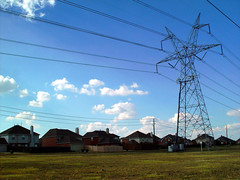The New Suburbanism versus The New Urbanism versus The Creative Class
I just finished listening to the latest Planetizen podcast, which featured Joel Kotkin, who wrote The City: A Global History, but has recently been more controversial for his new theory of "New Suburbanism. It's interesting, worth a listen.
Kotkin basically believes that the greatest space for economic growth lies in the suburbs and therefore we should focus economic development there. You may be wondering to yourself how that differs from the status quo. Kotkin suggests that there are good suburbs and bad suburbs. Good suburbs are ones that have ample public space, a good balance of residential and commercial uses and public goods, such as libraries and schools.
New Suburbanism and New Urbanism don't actually seem to go against each other all that much, when it really comes down to it. New Suburbanism allows more for cars and doesn't mind single family houses as much. Maybe I'm mistaken, but it seems that most New Urbanism is taking place in suburbs or greenfields anyways. It's really more about building denser suburbs than it is about repairing the problems of the city.
Kotkin actually seems to be responding to Richard Florida's The Creative Class. Florida believes that the rise of the information based economy has given rise to a new class of workers that he calls the creative class. His thesis is that companies move about the country trying to find the creative class which moves about the country trying to find the best urban environments. It's interesting work.
Kotkin argues that demographically, the suburbs are still growing faster than the cities and that those who prefer the city are just a minority (he gives the figure 20%). I think Florida would argue that, first of all, 20% preferring the city is a whole lot more then you would have gotten 10 years ago. Second, that 20% is more important to the economy then the other 80%. Florida actually addresses in his work that it's the service (read lower paying) jobs that are growing the fastest in the suburbs.
I don't think it's any secret that I prefer the city, so my tendency is toward Florida's work. I do, however find Kotkins ideas interesting. The suburbs are around for now (at least till we run out of oil), and there is no reason that they shouldn't be as good as possible. I also think that Kotkin's ideas are best applied to inner suburbs rather then new sprawl.
Kotkin basically believes that the greatest space for economic growth lies in the suburbs and therefore we should focus economic development there. You may be wondering to yourself how that differs from the status quo. Kotkin suggests that there are good suburbs and bad suburbs. Good suburbs are ones that have ample public space, a good balance of residential and commercial uses and public goods, such as libraries and schools.
New Suburbanism and New Urbanism don't actually seem to go against each other all that much, when it really comes down to it. New Suburbanism allows more for cars and doesn't mind single family houses as much. Maybe I'm mistaken, but it seems that most New Urbanism is taking place in suburbs or greenfields anyways. It's really more about building denser suburbs than it is about repairing the problems of the city.
Kotkin actually seems to be responding to Richard Florida's The Creative Class. Florida believes that the rise of the information based economy has given rise to a new class of workers that he calls the creative class. His thesis is that companies move about the country trying to find the creative class which moves about the country trying to find the best urban environments. It's interesting work.
Kotkin argues that demographically, the suburbs are still growing faster than the cities and that those who prefer the city are just a minority (he gives the figure 20%). I think Florida would argue that, first of all, 20% preferring the city is a whole lot more then you would have gotten 10 years ago. Second, that 20% is more important to the economy then the other 80%. Florida actually addresses in his work that it's the service (read lower paying) jobs that are growing the fastest in the suburbs.
I don't think it's any secret that I prefer the city, so my tendency is toward Florida's work. I do, however find Kotkins ideas interesting. The suburbs are around for now (at least till we run out of oil), and there is no reason that they shouldn't be as good as possible. I also think that Kotkin's ideas are best applied to inner suburbs rather then new sprawl.





1 comments:
yeah, i really liked the parking ones. Stuff like the fact that people looking for onstreet parking causes traffic congestion is so common sense, but you don't really think about it until someone says it. I'd like to read Schoop's book "High Cost of Free Parking" but it's like $60 so I'm going to try and wait for a paperback.
Post a Comment